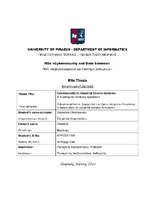Cybersecurity in industrial control systems : a roadmap for fortifying operations
Κυβερνοασφάλεια σε βιομηχανικά συστήματα ελέγχου και διαχείρισης : ο δρόμος προς την οχύρωση κρίσιμων λειτουργιών

Master Thesis
Συγγραφέας
Chairopoulou, Stamatina
Χαιροπούλου, Σταματίνα
Ημερομηνία
2024-06Προβολή/
Λέξεις κλειδιά
Critical infrastructures ; Industrial control systems ; ICS/OT ; Cyber risk management ; Cyber security programΠερίληψη
The seamless integration of information technology (IT) and operational technology (OT) has transformed industrial environments, exposing traditionally isolated OT networks to the broader IT ecosystem. This convergence presents both benefits and challenges, necessitating robust cybersecurity strategies tailored to the unique characteristics of OT environments. This dissertation delves into the evolving cybersecurity landscape of industrial control systems (ICS), exploring the multifaceted challenges, strategies, and future directions for safeguarding critical infrastructure from cyber threats. It meticulously examines the intricacies of IT-OT convergence, highlighting the contrasting nature of IT and ICS/OT, the benefits and challenges of their integration, and the evolving risk landscape confronting OT environments. Furthermore, the dissertation delves into the state of cybersecurity standards, regulations, and compliance strategies for ICS, identifying key frameworks across regional, national, and international domains, and emphasizing the critical role of compliance in mitigating cybersecurity risks. Strategic cyber defense development forms the core of the dissertation, exploring the diverse ICS cybersecurity program types and the pivotal role of risk management plans in safeguarding ICS assets. It presents a comprehensive framework for risk assessment, encompassing asset identification, vulnerability assessment, impact assessment, and risk mitigation strategies. The dissertation also scrutinizes cybersecurity implementation plans, emphasizing the importance of change management in navigating the transition to a more secure ICS environment. Active cyber defense strategies are explored in depth, highlighting the significance of threat intelligence and consumption, visibility through asset identification, threat detection, incident response, and threat and environment manipulation. Additionally, the dissertation examines the benefits and challenges of applying cutting-edge technologies in ICS cybersecurity field, including Cloud Computing, AI/ML, Blockchain, Digital Twins and Deception Technology. To illustrate how by building cybersecurity strategies for protecting critical infrastructure, the dissertation presents in-depth analyses of a few of the most notorious ICS attacks. The case studies analyzed in this research reveal that organizations could have enhanced their protection by implementing effective security measures across different tiers of the ICS defense architecture. The dissertation concludes by summarizing key findings, emphasizing the imperative of adopting a holistic cybersecurity approach in ICS environments, and outlining future research directions to address emerging cybersecurity challenges in the rapidly evolving OT landscape.


